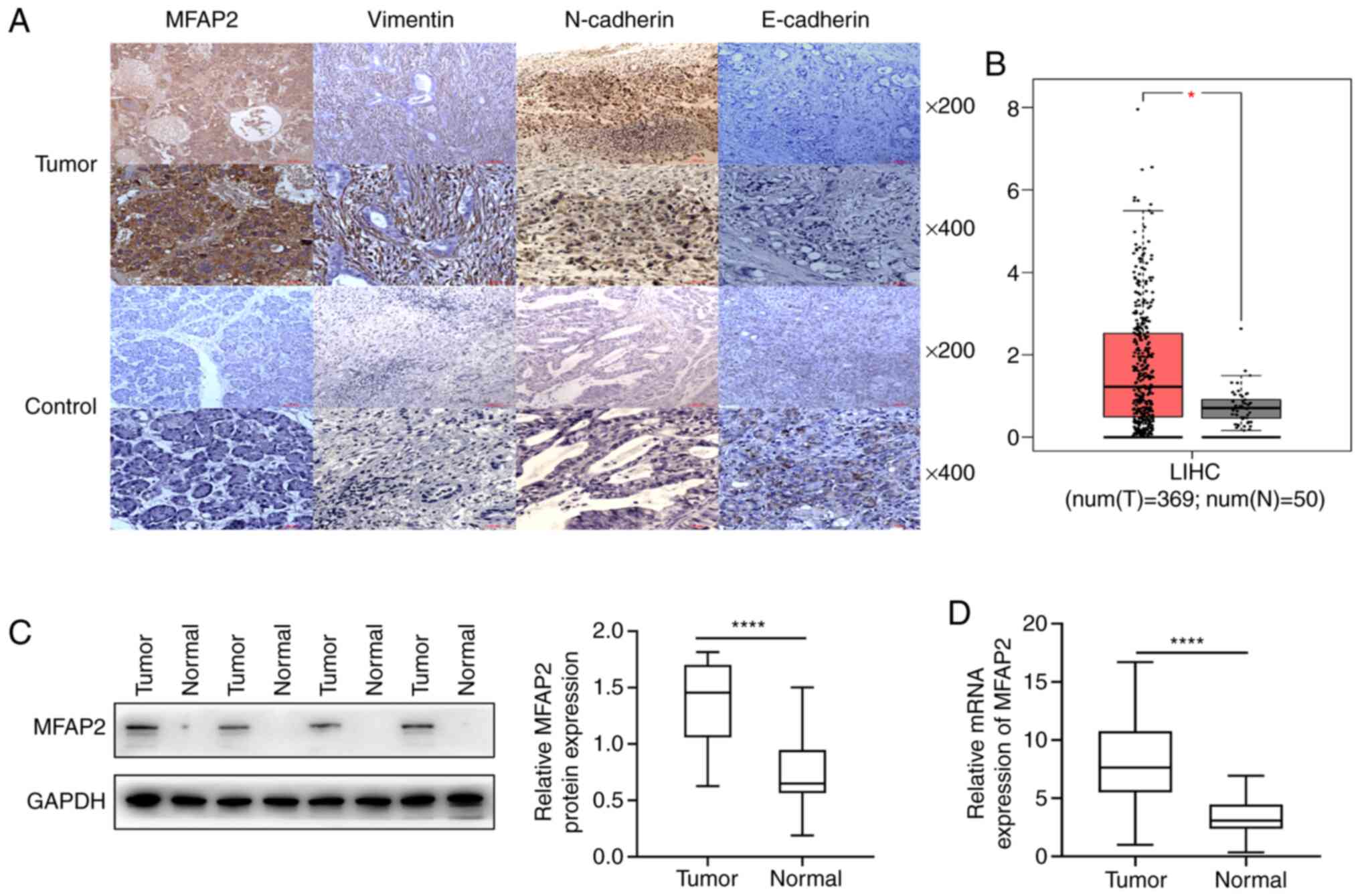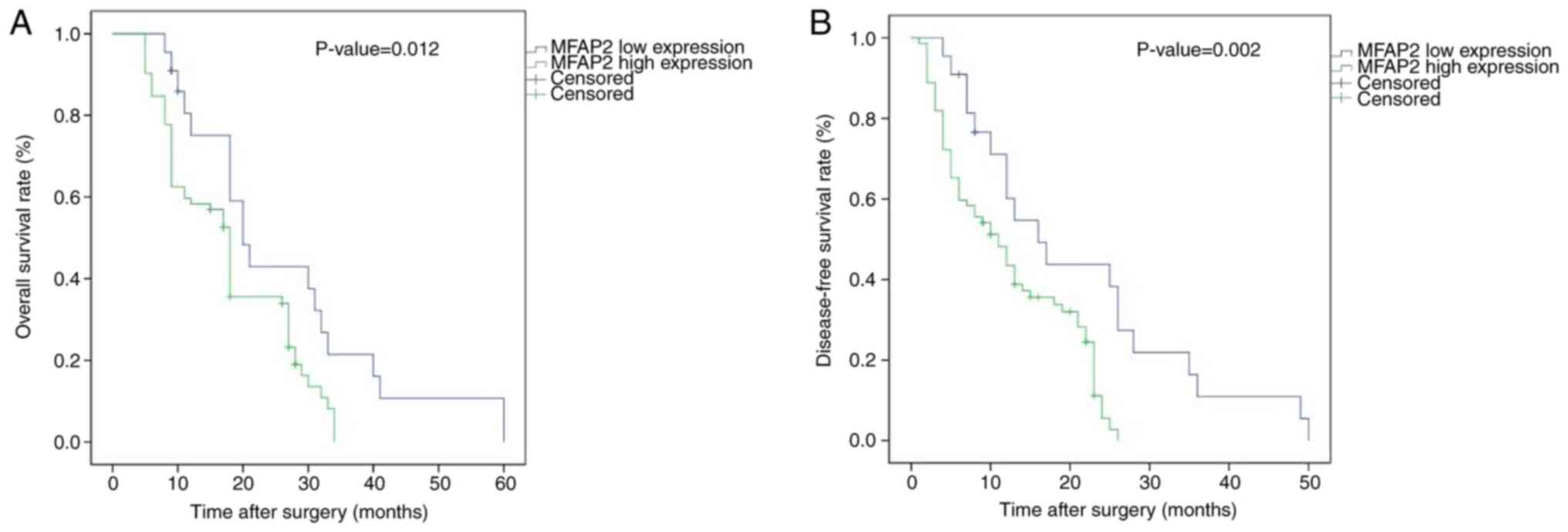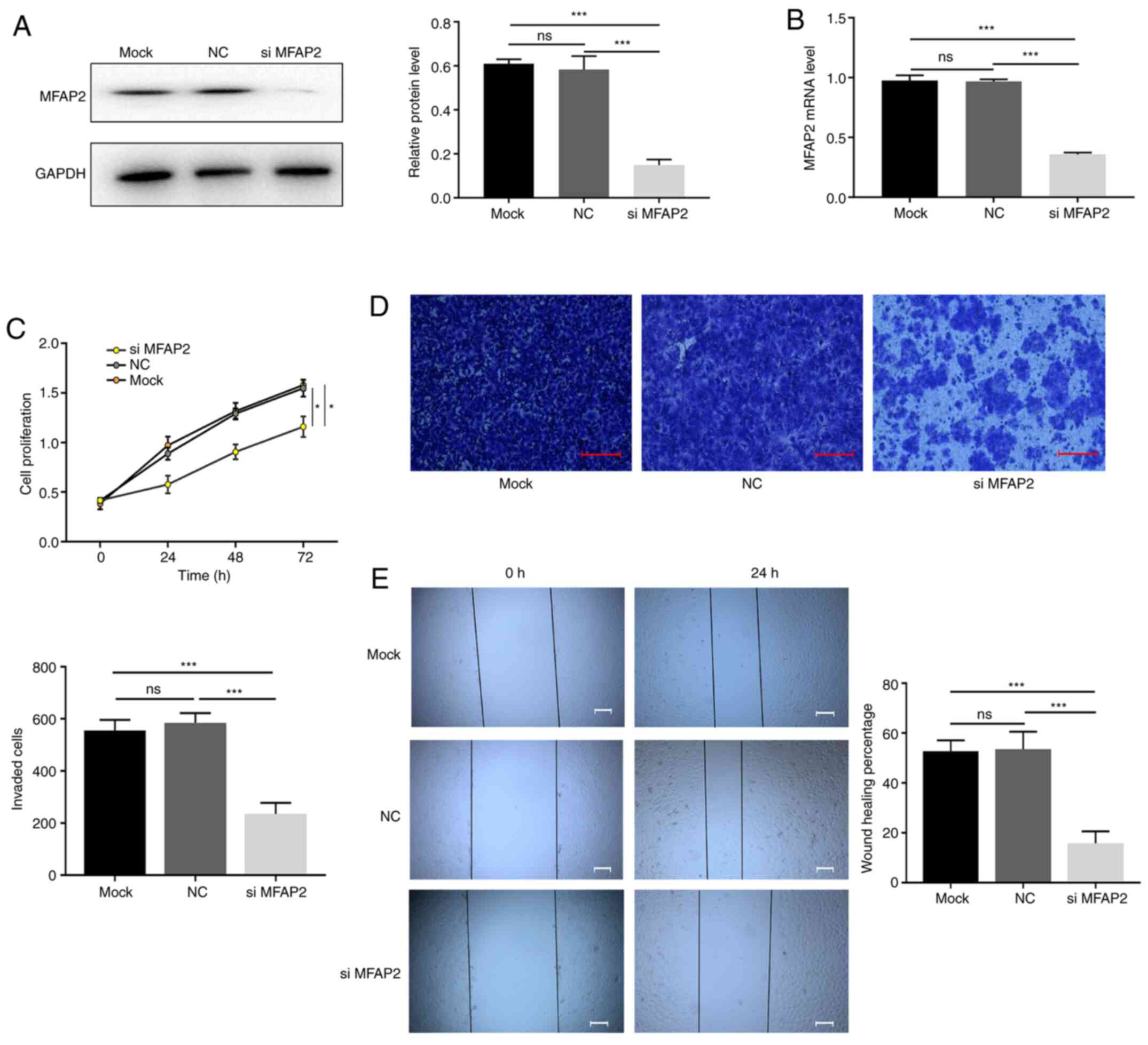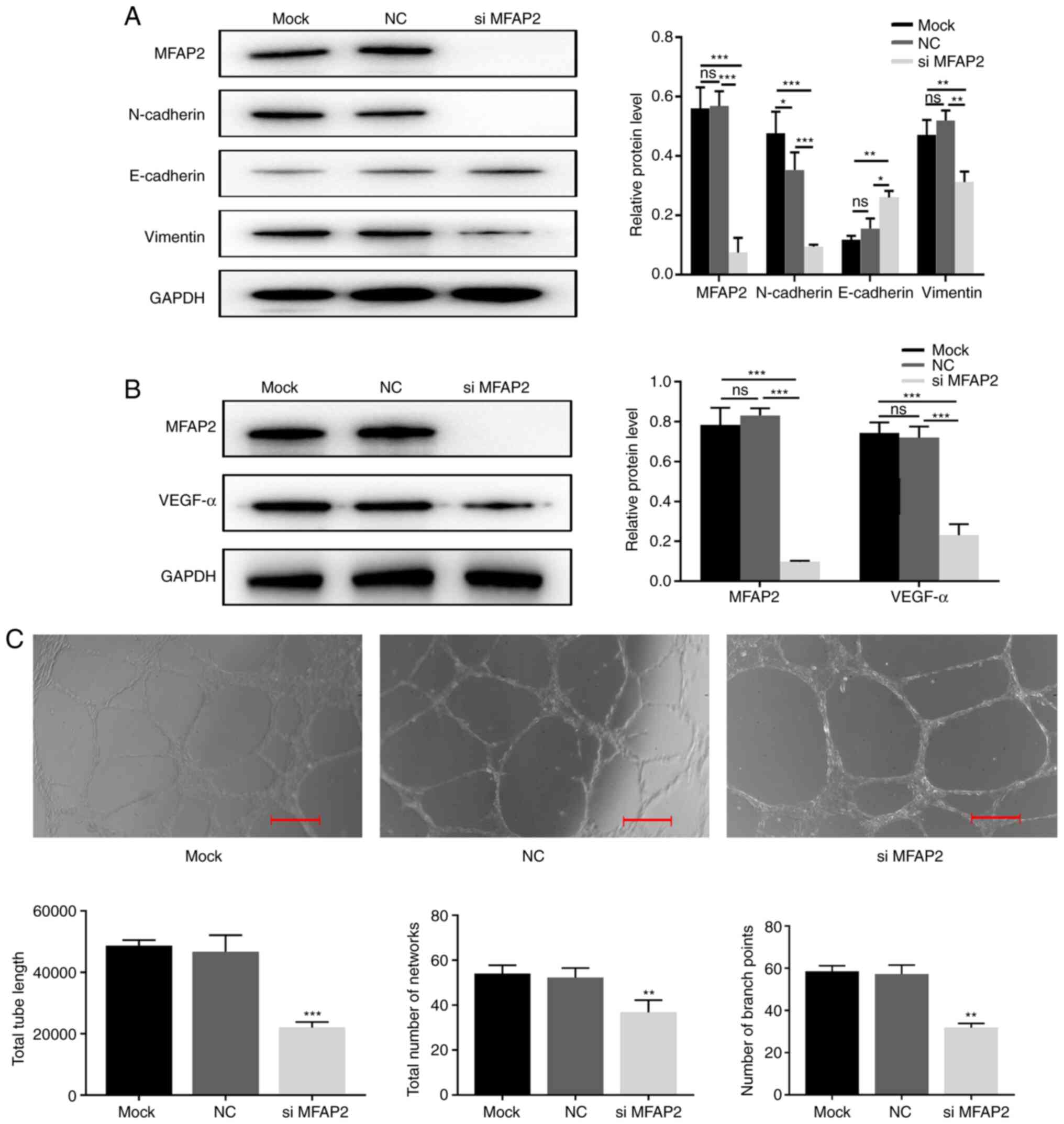|
1
|
Jemal A, Bray F, Center MM, Ferlay J, Ward
E and Forman D: Global cancer statistics. CA Cancer J Clin.
61:69–90. 2011. View Article : Google Scholar : PubMed/NCBI
|
|
2
|
Shen JD, Fu SZ, Ju LL, Wang YF, Dai F, Liu
ZX, Ji HZ, Shao JG and Bian ZL: High expression of
ubiquitin-conjugating enzyme E2A predicts poor prognosis in
hepatocellular carcinoma. Oncol Lett. 15:7362–7368. 2018.PubMed/NCBI
|
|
3
|
Zhai X, Wang W, Ma Y, Zeng Y, Dou D, Fan
H, Song J, Yu X, Xin D, Du G, et al: Serum KIAA1199 is an
advanced-stage prognostic biomarker and metastatic oncogene in
cholangiocarcinoma. Aging (Albany NY). 12:23761–23777. 2020.
View Article : Google Scholar : PubMed/NCBI
|
|
4
|
Penner AS, Rock MJ, Kielty CM and Shipley
JM: Microfibril-associated glycoprotein-2 interacts with
fibrillin-1 and fibrillin-2 suggesting a role for MAGP-2 in elastic
fiber assembly. J Biol Chem. 277:35044–35049. 2002. View Article : Google Scholar : PubMed/NCBI
|
|
5
|
Craft CS, Broekelmann TJ and Mecham RP:
Microfibril-associated glycoproteins MAGP-1 and MAGP-2 in disease.
Matrix Biol. 71-72:100–111. 2018. View Article : Google Scholar : PubMed/NCBI
|
|
6
|
Segade F, Suganuma N, Mychaleckyj JC and
Mecham RP: The intracellular form of human MAGP1 elicits a complex
and specific transcriptional response. Int J Biochem Cell Biol.
39:2303–2313. 2007. View Article : Google Scholar : PubMed/NCBI
|
|
7
|
Mecham RP and Gibson MA: The
microfibril-associated glycoproteins (MAGPs) and the microfibrillar
niche. Matrix Biol. 47:13–33. 2015. View Article : Google Scholar : PubMed/NCBI
|
|
8
|
Gong X, Dong T, Niu M, Liang X, Sun S,
Zhang Y, Li Y and Li D: lncRNA LCPAT1 upregulation promotes breast
cancer progression via enhancing MFAP2 transcription. Mol Ther
Nucleic Acids. 21:804–813. 2020. View Article : Google Scholar : PubMed/NCBI
|
|
9
|
Dong SY, Chen H, Lin LZ, Jin L, Chen DX,
Wang OC and Ye ZQ: MFAP2 is a potential diagnostic and prognostic
biomarker that correlates with the progression of papillary thyroid
cancer. Cancer Manag Res. 12:12557–12567. 2020. View Article : Google Scholar : PubMed/NCBI
|
|
10
|
Chen Z, Lv Y, Cao D, Li X and Li Y:
Microfibril-associated protein 2 (MFAP2) potentiates invasion and
migration of melanoma by EMT and Wnt/β-catenin pathway. Med Sci
Monit. 26:e9238082020. View Article : Google Scholar : PubMed/NCBI
|
|
11
|
Considine DPC, Jia G, Shu X, Schildkraut
JM, Pharoah PDP, Zheng W and Kar SP; Ovarian Cancer Association
Consortium, : Genetically predicted circulating protein biomarkers
and ovarian cancer risk. Gynecol Oncol. 160:506–513. 2021.
View Article : Google Scholar : PubMed/NCBI
|
|
12
|
Yao LW, Wu LL, Zhang LH, Zhou W, Wu L, He
K, Ren JC, Deng YC, Yang DM, Wang J, et al: MFAP2 is overexpressed
in gastric cancer and promotes motility via the MFAP2/integrin
α5β1/FAK/ERK pathway. Oncogenesis. 9:172020. View Article : Google Scholar : PubMed/NCBI
|
|
13
|
Sun T, Wang D, Ping Y, Sang Y, Dai Y, Wang
Y, Liu Z, Duan X, Tao Z and Liu W: Integrated profiling identifies
SLC5A6 and MFAP2 as novel diagnostic and prognostic biomarkers in
gastric cancer patients. Int J Oncol. 56:460–469. 2020.PubMed/NCBI
|
|
14
|
Zhu X, Cheng Y, Wu F, Sun H, Zheng W,
Jiang W, Shi J, Ma S and Cao H: MFAP2 promotes the proliferation of
cancer cells and is associated with a poor prognosis in
hepatocellular carcinoma. Technol Cancer Res Treat.
19:15330338209775242020. View Article : Google Scholar : PubMed/NCBI
|
|
15
|
Zhai LL, Cai CY, Wu Y and Tang ZG:
Correlation and prognostic significance of MMP-2 and TFPI-2
differential expression in pancreatic carcinoma. Int J Clin Exp
Pathol. 8:682–691. 2015.PubMed/NCBI
|
|
16
|
Zhai LL, Wu Y, Huang DW and Tang ZG:
Increased matrix metalloproteinase-2 expression and reduced tissue
factor pathway inhibitor-2 expression correlate with angiogenesis
and early postoperative recurrence of pancreatic carcinoma. Am J
Transl Res. 7:2412–2422. 2015.PubMed/NCBI
|
|
17
|
Livak KJ and Schmittgen TD: Analysis of
relative gene expression data using real-time quantitative PCR and
the 2(-Delta Delta C(T)) method. Methods. 25:402–408. 2001.
View Article : Google Scholar : PubMed/NCBI
|
|
18
|
Claesson-Welsh L and Welsh M: VEGFA and
tumour angiogenesis. J Intern Med. 273:114–127. 2013. View Article : Google Scholar : PubMed/NCBI
|
|
19
|
Craft CS: MAGP1, the extracellular matrix,
and metabolism. Adipocyte. 4:60–64. 2014. View Article : Google Scholar : PubMed/NCBI
|
|
20
|
Gibson MA, Hatzinikolas G, Kumaratilake
JS, Sandberg LB, Nicholl JK, Sutherland GR and Cleary EG: Further
characterization of proteins associated with elastic fiber
microfibrils including the molecular cloning of MAGP-2 (MP25). J
Biol Chem. 271:1096–1103. 1996. View Article : Google Scholar : PubMed/NCBI
|
|
21
|
Clarke AW and Weiss AS:
Microfibril-associated glycoprotein-1 binding to tropoelastin:
multiple binding sites and the role of divalent cations. Eur J
Biochem. 271:3085–3090. 2004. View Article : Google Scholar : PubMed/NCBI
|
|
22
|
Ju S, Wang F, Wang Y and Ju S: CSN8 is a
key regulator in hypoxia-induced epithelial-mesenchymal transition
and dormancy of colorectal cancer cells. Mol Cancer. 19:1682020.
View Article : Google Scholar : PubMed/NCBI
|
|
23
|
Jiang Z, Zhai X, Shi B, Luo D and Jin B:
KIAA1199 overexpression is associated with abnormal expression of
EMT markers and is a novel independent prognostic biomarker for
hepatocellular carcinoma. Onco Targets Ther. 11:8341–8348. 2018.
View Article : Google Scholar : PubMed/NCBI
|
|
24
|
Solanas G, Porta-de-la-Riva M, Agustí C,
Casagolda D, Sánchez-Aguilera F, Larriba MJ, Pons F, Peiró S,
Escrivà M, Muñoz A, et al: E-cadherin controls beta-catenin and
NF-kappaB transcriptional activity in mesenchymal gene expression.
J Cell Sci. 121:2224–2234. 2008. View Article : Google Scholar : PubMed/NCBI
|
|
25
|
Lamouille S, Xu J and Derynck R: Molecular
mechanisms of epithelial-mesenchymal transition. Nat Rev Mol Cell
Biol. 15:178–196. 2014. View
Article : Google Scholar : PubMed/NCBI
|
|
26
|
Gonzalez DM and Medici D: Signaling
mechanisms of the epithelial-mesenchymal transition. Sci Signal.
7:re82014. View Article : Google Scholar : PubMed/NCBI
|
|
27
|
Wendt MK, Tian M and Schiemann WP:
Deconstructing the mechanisms and consequences of TGF-β-induced EMT
during cancer progression. Cell Tissue Res. 347:85–101. 2012.
View Article : Google Scholar : PubMed/NCBI
|
|
28
|
Willis BC and Borok Z: TGF-beta-induced
EMT: Mechanisms and implications for fibrotic lung disease. Am J
Physiol Lung Cell Mol Physiol. 293:L525–L534. 2007. View Article : Google Scholar : PubMed/NCBI
|
|
29
|
Zhang Y, Ren H, Li J, Xue R, Liu H, Zhu Z,
Pan C, Lin Y, Hu A, Gou P, et al: Elevated HMGB1 expression induced
by hepatitis B virus X protein promotes epithelial-mesenchymal
transition and angiogenesis through STAT3/miR-34a/NF-κB in primary
liver cancer. Am J Cancer Res. 11:479–494. 2021.PubMed/NCBI
|
|
30
|
Zhou W, Yang L, Nie L and Lin H:
Unraveling the molecular mechanisms between inflammation and tumor
angiogenesis. Am J Cancer Res. 11:301–317. 2021.PubMed/NCBI
|
|
31
|
Jain S, Deore SV, Ghadi R, Chaudhari D,
Kuche K and Katiyar SS: Tumor microenvironment responsive
VEGF-antibody functionalized pH sensitive liposomes of docetaxel
for augmented breast cancer therapy. Mater Sci Eng C Mater Biol
Appl. 121:1118322021. View Article : Google Scholar : PubMed/NCBI
|
|
32
|
Kamiyama M and Augustin HG: Alternatively
spliced form of angiopoietin-2 as a new vascular rheostat. Cancer
Res. 81:35–37. 2021.PubMed/NCBI
|
|
33
|
Varone E, Decio A, Chernorudskiy A, Minoli
L, Brunelli L, Ioli F, Piotti A, Pastorelli R, Fratelli M, Gobbi M,
et al: The ER stress response mediator ERO1 triggers cancer
metastasis by favoring the angiogenic switch in hypoxic conditions.
Oncogene. 40:1721–1736. 2021. View Article : Google Scholar : PubMed/NCBI
|
|
34
|
Quan L, Ohgaki R, Hara S, Okuda S, Wei L,
Okanishi H, Nagamori S, Endou H and Kanai Y: Amino acid transporter
LAT1 in tumor-associated vascular endothelium promotes angiogenesis
by regulating cell proliferation and VEGF-A-dependent mTORC1
activation. J Exp Clin Cancer Res. 39:2662020. View Article : Google Scholar : PubMed/NCBI
|


















